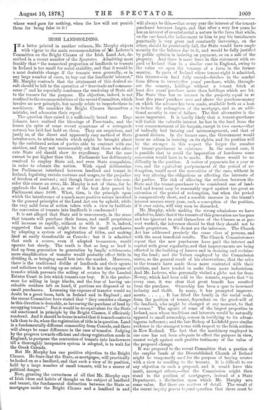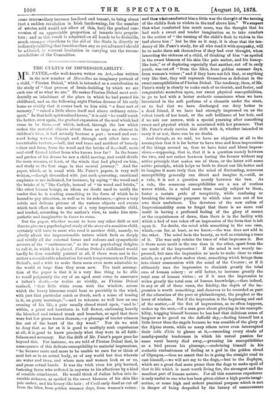IRISH LANDHOLDING.
IN a letter printed in another column, Mr. Murphy objects 1 with vigour to the main recommendation of Mr. Lefevre's Committee on the Bright Clauses of the Irish Land Act, de-
scribed in a recent number of the Spectator. Admitting most frankly that" the numerical proportion of landlords to tenants
in Ireland is too small for social stability, and that it would be a most desirable change if the tenants were generally, or in any large number of cases, to buy out the landlords' interest," Mr. Murphy contends that the attainment of this desired re- sult should be left to the operation of" free-trade and common- sense ;" and he especially condemns the rendering of State aid to the tenants for the purpose. His objection, indeed, is not confined to the recommendations of the recent Committee, which involve no new principle, but merely relate to imperfections in machinery. He considers the Bright Clauses themselves a mistake, and advocates their repeal.
The question thus raised is a sufficiently broad one. Eng- lishmen have realised the blessings of Free-trade, and the lesson (in spite of some recent symptoms of a retrograde nature) has laid fast hold on them. They are suspicious, and justly so, of the direct and apparently easy method of State interference, to attain results which might be brought about by the unfettered action of parties able to contract with one another, and they not unreasonably ask that those who advo- cate State aid should show its expediency. But the case cannot be put higher than this. Parliament has deliberately resolved to employ State aid, and even State compulsion, in order to educate the nation. With equal deliberation has Parliament interfered between landlord and tenant in Ireland, legalising certain customs and usages, to the prejudice of freedom of contract ; and though there are those who con- sider this course an error, Mr. Murphy is not of them, for he applauds the Land Act, as one of the best Acts passed by Parliament since 1688. What, then, is the principle upon which the interference of a much more positive nature involved in the general principles of the Land Act can be upheld, while the very mild form of action taken with a view to facilitate the conversion of tenants into landlords is condemned ?
It is not alleged that State aid is unnecessary, in the sense that tenants will purchase their farms, and small proprietors will increase as rapidly, without as with it. It is, indeed, suggested that much might be done for small purchasers by adopting a system of registration of titles, and making land as easily transferable as Consols ; but it is admitted that such a course, even if adopted to-morrow, would operate but slowly. The truth is that as long as land is tied up from generation to generation by family settlements, mere simplification of transfer would probably effect little in dividing it, or bringing small lots into the market. Moreover, there is the traditional dislike of landlords and their agents and solicitors to cutting up an estate. It is not the expense of transfer which prevents the selling of estates by the Landed Estates Court in lots which tenants can buy. It is the prefer- ence for selling in large blocks, and the fear of having un- saleable residues left on hand, if portions are disposed of to small purchasers. Lessening the expense of transfer would no doubt be a great boon, both in Ireland and in England ; and the recent Committee have stated that "they consider a change in this direction is desirable, as favouring the purchase of land by occupying tenants." But it would be no equivalent for the State aid sanctioned in principle by the Bright Clauses, if efficiently rendered. And it should be borne in mind that it is much easier to talk than to do, when the registration of title is in question. Land is a fundamentally different commodity from Consols, and there will always be some difference in the ease of transfer. Judging by the progress towards efficient and cheap registration made in England, to postpone the conversion of tenants into landowners till a thoroughly inexpensive system is adopted, is to wait for the Greek Calends.
But Mr. Murphy has one positive objection to the Bright Clauses. He fears that the State, as mortgagee, will practically be looked on as a landlord, and that such a view of its position, held by a large number of small tenants, will be a source of political danger.
Now, granting the correctness of all that Mr. Murphy says of Irish ideas and habits of thought on the subject of landlord and tenant, the fundamental distinction between the State as mortgagee under the Bright Clauses and a landlord is and will always be this,—that every year the interest of the tenant- purchaser becomes larger, and that after a very few years he has an interest of so substantial a nature in the farm that while, on the one hand, the inducement to him to pay his instalments punctually is very great and constantly increasing, on the other, should he persistently fail, the State would have ample security for the balance due to it, and would be fully justified by public opinion in insisting on payment, or on a sale of the property. And there is more force in this statement with re- gard to Ireland than in a similar case in England, owing to the value set upon the tenancy of a farm in the former country. In parts of Ireland where tenant-right is admitted, this interest—in land fully rented—fetches in the market from fifteen to twenty-five years' purchase, while, through- out the country, holdings without a tenant fetch at least five years' purchase more than holdings which are let. The State thus has an interest in the property equal to at least five years' purchase over and above the purchase-money on which the advance has been made, available both as a loan to induce the redemption of the mortgage, and as an addi- tional security in case of failure. The first alternative is the more important. It is hardly likely that a tenant-purchaser will forfeit the valuable interest he has in the land from the very commencement of his bargain, except in two cases,—that of radically bad fanning and mismanagement, and that of general distress. In the former case, the Government would incur no odium in insisting on its rights, and its position will be the stronger in this respect the larger the number of tenant-purchasers in existence. In the second case, it is possible that to avoid the imputation of harshness some concession would have to be made. But there would be no difficulty in the position. A waiver of payments for a year or two, and the equivalent postponement of the period of re- demption, would meet the necessities of the case, without in any way altering the obligations or affecting the interests of the parties. The risk of allowing the relation between the State and the tenant-purchaser to be considered one of land- lord and tenant may be reasonably urged against too great an extension of the period of redemption, but when the period is comparatively short, and a sensible increase in the tenant's interest accrues every year, such a conception of the position, if it ever exists, will very soon be discarded.
Mr. Murphy, while making the strong admissions we have alluded to, hints that if the tenants of this generation are too poor and too ignorant to avail themselves of the Clauses as at pre- sent worked, the inference should be that they should not be made proprietors. We do not see the inference. The Church Act has addressed precisely the same class of persons, and with the most beneficial results. The Church Commissioners report that the new purchasers have paid the interest and capital with great regularity, and that improvements are being effected in the building of houses and in draining and reclaim- ing the land ; and the Valuer employed by the Commission states, as the general result of his observations, that the sales to the tenants have made them more contented with their position, and have tended to make them more industrious. And Mr. Lefevre, who personally visited a glebe not far from Newry, which had been sold to the tenants, reports that "in every case, it was clear that great benefit has resulted from the purchase. Ownership has been a spur to increased industry and thrift. In many, it has prompted improve- ments It has lifted the family in the social scale, from the position of tenant, dependent on the good-will of the landlord, who might be changed at any moment, to that of owner." The agents of some of the largest properties in Ireland, men whose traditions and interests would be naturally opposed to small ownership, concur in testifying to its advan- tageous influence ; and the late Bishop of Lichfield gave similar evidence in the strongest terms with respect to the Irish settlers in New Zealand. The fact that the machinery employed in one case has not been adequate to effect the purpose in view, cannot weigh against such positive testimony of the value of the proposed change. It was proposed to the recent Committee that a portion of the surplus funds of the Disestablished Church of Ireland might be temporarily used for the purpose of buying estates with a view to reselling to the tenants. It is difficult to see any objection to such a proposal, and it would have this merit, amongst others,—that the Commission might then stand in the position of mortgagees, instead of a State Department, a distinction upon which Mr. Murphy sets some value. But these are matters of detail. The result of the recent inquiry proves beyond question that there must be some intermediary between landlord and tenant, to bring about (not a sudden revolution in Irish landowning, for the number of estates sold would not allow of this, but) the gradual con- version of an appreciable proportion of tenants into proprie- tors; and as this result is admitted on all hands to be desirable, much stronger objections to the aid of the State in directly or indirectly fulfilling that function than any as yet advanced should be adduced, to warrant hesitation in carrying out the recom- mendations of the Committee.































 Previous page
Previous page